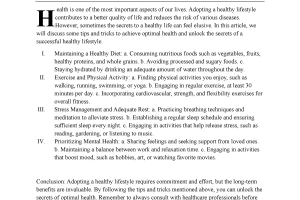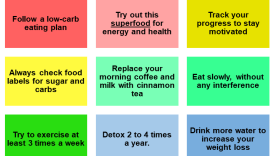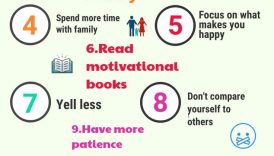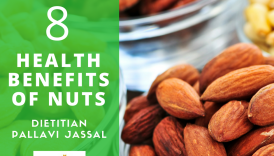Unlocking the Secrets to a Healthier Lifestyle: CDC’s Insights

Overview of CDC’s Insights
The Centers for Disease Control and Prevention (CDC) consistently provides valuable insights into public health, emphasizing the necessity of preventive measures and lifestyle choices that can significantly alter our health trajectories. It’s not just about avoiding illness; it’s about thriving through informed choices. The data revealed by the CDC signifies trends in nutrition, physical activity, and even mental well-being. For instance, a recent report highlighted that individuals who maintain a balanced diet and engage in regular exercise can reduce their risk for chronic diseases by over 30%. The CDC also points out the alarming rates of obesity and related health issues across all demographics. This draws attention to the need for strategic interventions that foster healthier lifestyles.
- Unlocking the Secrets to a Healthier Lifestyle: CDC’s Insights
- Overview of CDC's Insights
- Importance of a Healthier Lifestyle
- Nutrition Guidelines
- Balanced Diet Recommendations
- Impact of Nutrition on Health
- Physical Activity
- Exercise Recommendations
- Benefits of Regular Physical Activity
- Mental Well-being
- Strategies for Stress Management
- Importance of Mental Health Awareness
- Preventive Healthcare
- Vaccination Recommendations
- Screening Guidelines
- Healthy Habits
- Importance of Hydration
- Sleep Hygiene Tips
Importance of a Healthier Lifestyle
Embracing a healthier lifestyle isn’t merely a trend; it’s a crucial investment in one’s future. Healthier living choices can enhance quality of life, reduce healthcare costs, and increase longevity. Consider the following key aspects:
- Improved Energy Levels: A balanced diet and regular exercise can lead to noticeable improvements in overall energy.
- Mental Clarity: Physical activity has proven benefits for cognitive function and emotional well-being.
- Social Connections: Engaging in group exercises or healthy cooking classes can foster new relationships while improving health.
Just think about it: when you nourish your body and mind, you’re not just adding years to your life; you’re adding life to your years. The choices made today can lead to a healthier tomorrow. Whether it’s opting for a home-cooked meal over fast food or taking a brisk walk instead of scrolling through your phone, each step counts. Making these conscious decisions is integral, not just for individual health but for community wellness as well.
Nutrition Guidelines
Balanced Diet Recommendations
Following up on the insights regarding healthier lifestyles, understanding nutrition is paramount. A balanced diet serves as the foundation for overall well-being. The CDC recommends that a balanced diet includes a variety of foods from different food groups. Here are key components to consider:
- Fruits and Vegetables: Aim for half your plate to be filled with colorful fruits and vegetables, as they are rich in vitamins, minerals, and antioxidants.
- Whole Grains: Choose whole grains over refined grains. For instance, opt for brown rice, whole wheat bread, and oatmeal, which provide more fiber and nutrients.
- Lean Proteins: Include sources of lean protein such as chicken, fish, beans, and legumes. These are essential for muscle repair and overall bodily functions.
- Healthy Fats: Incorporate healthy fats from sources like avocados, nuts, and olive oil, while limiting saturated and trans fats.
Impact of Nutrition on Health
The importance of nutrition extends far beyond the dinner plate. It is fundamentally linked to physical, mental, and emotional health. For instance, a friend of mine, who made the switch to a plant-based diet, noticed not only improved physical health but also a brighter outlook on life. The impact of nutrition can be chunked into several categories:
- Chronic Disease Prevention: A balanced diet significantly lowers the risk of conditions like heart disease, diabetes, and obesity.
- Mental Health: Certain nutrients are known to influence mood. Omega-3 fatty acids, found in fish, have been linked to reduced depression rates.
- Weight Management: Consuming nutrient-dense foods helps in maintaining a healthy weight, promoting better metabolism.
Ultimately, the choices made in our diet today will pave the way for a healthier tomorrow. So, adopting these balanced diet recommendations can significantly enhance one’s overall quality of life.
Physical Activity
Exercise Recommendations
Building on the foundation of good nutrition, incorporating regular physical activity is equally crucial for a healthy lifestyle. The CDC suggests that adults should aim for at least 150 minutes of moderate-intensity aerobic exercise each week. This might sound daunting, but it can easily fit into your daily routine. Here are some practical recommendations to get started:
- Daily Walks: A brisk 30-minute walk five times a week can do wonders for your cardiovascular health.
- Strength Training: Incorporate strength exercises at least two days a week. Activities like lifting weights, yoga, or even body-weight exercises count!
- Mix It Up: Engage in a variety of activities to keep things exciting. Try cycling, swimming, dancing, or team sports.
Keep in mind that any movement counts, so even small bursts of activity throughout your day can add up.
Benefits of Regular Physical Activity
The benefits of regular physical activity are vast and impactful. Personally, I’ve found that my mood significantly improves after a workout session; it’s truly an instant mood booster! Here are some key benefits worth noting:
- Physical Health: Regular exercise helps maintain a healthy weight, reduces the risk of chronic diseases, and boosts the immune system.
- Mental Clarity: Physical activity increases blood flow to the brain. This can lead to improved cognitive function and memory.
- Stress Relief: Engaging in exercise releases endorphins, often referred to as “feel-good hormones.” It’s a natural way to combat stress and anxiety.
- Better Sleep: Regular exercise can help regulate sleep patterns, leading to more restful and rejuvenating nights.
Incorporating physical activity into daily life doesn’t have to be rigid or boring. Finding activities you enjoy not only makes exercise more enjoyable but also ensures you stick with it for the long term. The road to a healthier lifestyle is paved with consistent, joyful movement!
Mental Well-being
Strategies for Stress Management
Transitioning from the physical benefits of staying active, it’s crucial to also focus on mental well-being. Managing stress effectively is a vital component of maintaining overall health. With today’s fast-paced lifestyles, stress can often feel overwhelming. However, there are several strategies to keep it under control. Here are some techniques that have worked for many:
- Mindfulness and Meditation: Taking just a few minutes daily to practice mindfulness or meditation can help center your thoughts and reduce anxiety. I personally find that even five minutes of deep breathing can ground me for the day ahead.
- Connect with Nature: Spending time outdoors has been shown to decrease stress levels. A simple walk in the park or weekend hikes can refresh both body and mind.
- Practice Gratitude: Keeping a gratitude journal helps shift focus from stressors to positive aspects of life. Regularly reflecting on what you are thankful for can enhance mental resilience.
Importance of Mental Health Awareness
Mental health is as important as physical health, yet it’s often overlooked. Raising awareness about mental health is crucial for dismantling stigmas associated with mental illnesses. Here are key points to understand:
- Education: Increasing awareness can lead to better understanding and support for individuals struggling with mental health issues. This could be as simple as discussing mental health openly with friends and family.
- Early Intervention: Recognizing signs of mental distress early can lead to timely help and treatment. Just as with physical ailments, addressing mental health issues promptly can minimize their impact.
- Community Support: Being part of a supportive community can make a significant difference. Engaging in discussions, workshops, or support groups fosters an environment of encouragement and healing.
In conclusion, while we focus on balanced diets and physical activity, prioritizing mental well-being is just as imperative. Balancing the mind, body, and spirit creates a holistic approach to health, empowering individuals to lead fulfilling lives.
Preventive Healthcare
Vaccination Recommendations
Continuing the theme of holistic health, preventive healthcare is a cornerstone for maintaining overall wellness, and vaccinations play a pivotal role in this regard. Keeping your immunizations up to date is not just about protecting yourself; it’s about safeguarding your community as well. The CDC provides specific vaccination recommendations that vary by age and health status. Here are some key vaccinations to consider:
- Flu Vaccine: Annually getting the flu shot can prevent severe illness and complications.
- Tdap Vaccine: This vaccine protects against tetanus, diphtheria, and pertussis, and it’s vital for all adults, especially those who are pregnant or around infants.
- COVID-19 Vaccine: Staying updated on COVID-19 vaccinations helps protect against severe disease and aids in controlling outbreaks.
Remember, discussing your vaccination history with your healthcare provider can ensure you’re on the right track.
Screening Guidelines
In addition to vaccinations, regular screenings are essential in preventive healthcare, allowing for early detection of potential health issues. Just as I learned from my own experiences, regular check-ups can reveal health problems before they escalate. Here are some important screening guidelines recommended by health professionals:
- Blood Pressure Checks: Regular monitoring helps detect hypertension, which is often termed the “silent killer.”
- Cholesterol Screening: Adults should have their cholesterol levels checked every 4-6 years or more frequently if they have risk factors.
- Cancer Screenings: Depending on age and gender, screenings for breast, cervical, prostate, and colon cancer are crucial.
Overall, prioritizing preventive healthcare through vaccinations and screenings is a proactive way to stay healthy. Taking these steps not only protects you but also contributes to the well-being of those around you. A healthier you leads to a healthier community!
Healthy Habits
Importance of Hydration
As we wrap up our discussion on preventive healthcare, it’s essential to delve into healthy habits that complement and enhance overall well-being. One habit that cannot be overlooked is proper hydration. Staying hydrated is crucial for nearly every function within the body, from temperature regulation to cognitive performance. Personally, I’ve noticed a significant increase in my energy levels and focus when I prioritize my water intake. Here’s why hydration matters:
- Boosts Energy Levels: Even mild dehydration can lead to fatigue. Aim to drink at least 8 cups (64 ounces) of water a day, adjusting for activity level and weather.
- Aids Digestion: Adequate hydration helps with proper digestion and can prevent constipation.
- Promotes Healthy Skin: Drinking enough water can improve skin elasticity and overall appearance.
Carrying a water bottle during your daily routine can make it easier to meet your hydration goals.
Sleep Hygiene Tips
Equally important to hydration is the quality of sleep. Good sleep hygiene can transform not just your nights but also your days, leading to improved mental and physical health. I’ve often found that prioritizing sleep has enhanced my mood and productivity. Here are some practical sleep hygiene tips to consider:
- Establish a Regular Sleep Schedule: Going to bed and waking up at the same time each day helps regulate your body’s natural clock.
- Create a Restful Environment: Keep your sleep space dark, quiet, and cool. Consider using blackout curtains and a white noise machine if necessary.
- Limit Screen Time: Avoid screens at least an hour before bed, as blue light can interfere with your ability to fall asleep.
By integrating these healthy habits into your daily routine, you not only nurture your physical health but also foster mental resilience, setting a strong foundation for a vibrant life. With a focus on hydration and sleep hygiene, the journey to overall wellness is within reach!





